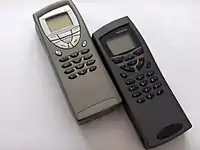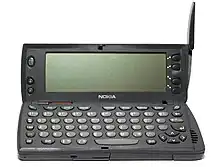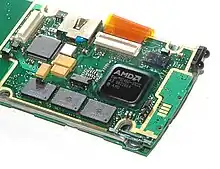Nokia 9000 Communicator
The Nokia 9000 Communicator was the first product in Nokia's Communicator series, announced at CeBIT 1996 and introduced into the market on 15 August 1996.[1] The phone weighed 397 grams (14.0 oz),[2] is powered by an Intel 24 MHz i386 CPU,[3] and has 8 MB of memory. The memory is divided between applications (4 MB), program memory (2 MB) and user data (2 MB).[2] The operating system is PEN/GEOS 3.0. The Communicator is one of the earliest smartphones on the market,[4] after the IBM Simon in 1994 and the HP OmniGo 700LX, a DOS-based palmtop PC with integrated cradle for the Nokia 2110 cellular mobile phone, announced in late 1995 and shipped in March 1996.[5]

The Communicator was highly advanced, featuring sending and receiving e-mail and fax via its 9.6 kbit/s GSM modem, and it also had a web browser and business programs.[6] It is formed of a clamshell design that opens up to reveal a monochrome LCD display with a 640 × 200 resolution and a full QWERTY keyboard similar to a Psion PDA.[2] It was priced £1,000 in the UK upon launch (equivalent to £2,000 in 2021). Then-CEO of Nokia, Jorma Ollila, said in 2012 regarding the device: "We were five years ahead."[7]
9110



The Nokia 9110 Communicator is the updated model of the Nokia 9000 Communicator in the Communicator series. Its biggest change from the 9000 is that it weighs much less.
Specifications
- Operating system: GEOS (running on top of ROM-DOS) on the PDA side
- Main applications: Fax, short messages, email, Wireless imaging: digital camera connectivity, Smart messaging, TextWeb, Web browser, Serial Terminal, Telnet, Contacts, Notes, Calendar, Calculator, world time clock, Composer.
- Display: 640 × 200 Pixels
- Size: 158 mm × 56 mm × 27 mm
- Weight: 253 g
- Processor: Embedded AMD Élan SC450 Am486 processor at 33 MHz[8][9]
- Memory: 8 MB total, 4 MB Operating System and applications, 2 MB program execution, 2 MB user data storage, MMC card.
Successors
The product line was discontinued in 2000 by the introduction of Nokia 9210 Communicator which introduced a wide TFT colour internal screen, 32-bit ARM9-based RISC CPU at 52 MHz, 16 MB of internal memory, enhanced web abilities and most importantly saw the operating system change to the Symbian operating system. The 9210i launched in 2002 increased the internal memory to 40 MB, video streaming and flash 5 support for the web browser.
The 9xxx Communicators introduced features which later evolved into smartphones.
Awards
The Nokia 9000 Communicator received several awards including:[10]
- GSM World Award (for innovation) at GSM World Conference 1997
- Best Technological Advance by Mobile News UK
- Best New Product 1997 by Business Week magazine
In popular culture
The Nokia 9000 is used by Val Kilmer when he played Simon Templar in the 1997 remake of The Saint,[11] and by Anthony Hopkins and Chris Rock in the action comedy Bad Company.
The phone is also mentioned in Bret Easton Ellis' book Glamorama.
References
- "First GSM-based communicator product hits the market Nokia Starts Sales of the Nokia 9000 Communicator". Nokia (Press release). 15 August 1996. Archived from the original on 3 June 2016. Retrieved 1 October 2019.
- "Nokia 9000 Communicator | Device Specs". PhoneDB. 13 October 2007. Retrieved 1 October 2019.
- "Nokia Unveils World's First All-In-One Communicator For The Americas". Nokia (Press release). 19 September 1996. Archived from the original on 31 October 2013. Retrieved 1 October 2019.
- Vor 20 Jahren: Die Smartphone-Ära beginnt mit großem Communicator, heise.de (German)
- "HP's OmniGo 700LX Communicator Plus". www.palmtoppaper.com.
- Meadows, Andy (January 2013). ASP.Net MVC 4 Mobile App Development. ISBN 9781849687379.
- Baguley, Richard (August 1, 2013). "The Gadget We Miss: The Nokia 9000 Communicator". Medium.
- A photograph of the insides of the case, with the CPU, can be seen in the last picture on the right side of this page.
- Data sheet of the processor
- "Nokia Annual Report 1997" (PDF). Retrieved 2019-11-14.
- Nokia. (1997, Apr 9). Nokia 9000 Communicator makes a visible appearance in "THE SAINT" Archived 2012-06-11 at the Wayback Machine Retrieved Apr 30, 2016, from Nokia
External links
- (in Finnish) More info